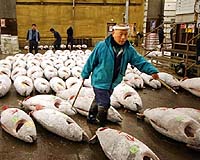 |
Tokyo (AFP) March 28, 2010 Japanese media voiced suspicion Sunday about Beijing's motives after China announced the arrest of a factory worker accused of poisoning frozen dumplings destined for Japan. The arrest came two years after Tokyo first pressed Beijing to investigate the case of the pesticide-tainted dumplings that made 10 people sick in Japan, including a small child, triggering a row between the two neighhbours. "This does not resolve the issue of food safety," the liberal Asahi Shimbun newspaper charged in an editorial, while others questioned why the investigation had taken so long and demanded an apology from China. China's official Xinhua news agency said Friday that Lu Yueting, 36, had been arrested on suspicion of injecting poison into the dumplings while working at a factory in northern China. Authorities described him as a disgruntled worker who acted out of revenge because he was dissatisfied with his pay and did not get along with colleagues. "It is difficult for consumers inside and outside China to accept such a simplistic explanation," the Asahi Shimbun said. Initially, China had insisted that the poison was injected into the dumplings after they had reached Japan, in a spat that adding to tensions over energy and territorial disputes between the neighbours. "Undoubtedly, the initial Chinese reaction fuelled Japanese consumers' distrust. Why did the investigation take so long?" Japan's Mainichi Shimbun said in an editorial. "We hope China will fulfill its responsibility to explain." The dumpling incident led Japanese consumers to avoid Chinese frozen food, which temporarily disappeared from stores in Japan. And concerns about Chinese food imports were further heightened in late 2008 after six Chinese infants died and almost 300,000 were made ill by milk powder laced with the industrial chemical melamine. The incidents depressed Chinese vegetable imports to Japan by roughly 20 percent in 2008 from the previous year, although it still remained a major source of fresh and frozen food for Japanese consumers. Taiwan and other regional countries increased their food exports to Japan to offset the reduction of Chinese products shipped to Japan. "Japan must strengthen monitoring of food imports while demanding China to step up its food safety measures," the top-selling Yomiuri Shimbun said in an editorial. The conservative Sankei Shimbun newspaper said that now Beijing had acknowledged that the suspect was a Chinese national, the Japanese government should push for an apology and compensation. Japanese Prime Minister Yukio Hatoyama has moved to improve ties with China since coming to power six months ago, but has also repeatedly said concerns over the safety of imported Chinese food were an "obstacle." Hatoyama said on Saturday that Japan would remain in close contact with the Chinese authorities over the dumpling case. "Hopefully this case will be resolved quickly in order for Japan-China relations to develop further."
Share This Article With Planet Earth
Related Links Farming Today - Suppliers and Technology
 Chile tsunami costs Japanese fisheries 68 million dollars
Chile tsunami costs Japanese fisheries 68 million dollarsTokyo (AFP) March 27, 2010 The Pacific-wide tsunami generated by the massive undersea earthquake off Chile's coast last month caused 68 million dollars of damage to Japan's fishing industry, a report said Saturday. Scallop, oyster and seaweed farms off the northeast coast of Japan were hit when waves up to 1.45 metres high smashed into Japan following the quake thousands of kilometres (miles) away. More than six b ... read more |
|
| The content herein, unless otherwise known to be public domain, are Copyright 1995-2010 - SpaceDaily. AFP and UPI Wire Stories are copyright Agence France-Presse and United Press International. ESA Portal Reports are copyright European Space Agency. All NASA sourced material is public domain. Additional copyrights may apply in whole or part to other bona fide parties. Advertising does not imply endorsement,agreement or approval of any opinions, statements or information provided by SpaceDaily on any Web page published or hosted by SpaceDaily. Privacy Statement |